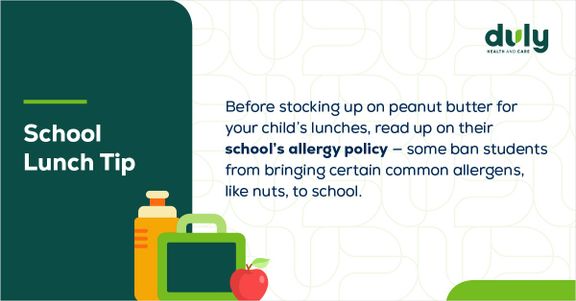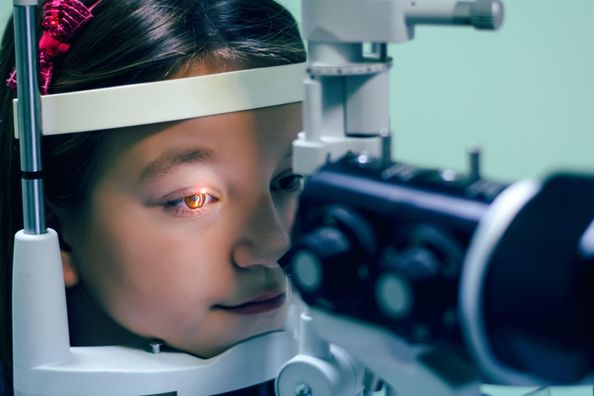With the beginning of the school year just around the corner — it’s not a bad idea to start thinking about what your new back-to-school routine will look like.
Your child is about to learn a lot of new facts, so why not join them?
Here are 6 facts to keep in mind as you and your child plan for the upcoming school year.
1. Children and teens consume about 35% to 40% of the daily calorie intake at school.*
And about a third of those calories are not healthy choices. With children getting most of their calories from food consumed at school, it’s important to do everything you can to empower your child to eat healthy during the school day. You can do this by:
- Getting creative. Replace the baggie of carrots with something more fun. The American Academy of Pediatrics has a great library of kid-friendly healthy recipes.
- Letting your child choose between healthy choices, like grapes or an apple, or applesauce or yogurt, so they’re more likely to actually eat the lunch you pack.
- Teaching them about the benefits of eating healthy at school, and about how some foods can make the school day uncomfortable. For example, certain types of foods, like those rich in carbohydrates, can cause sleepiness after eating them.
*This is based on the more than 55 million children and teens in the US public school system, according to the American Academy of Pediatrics.

Before stocking up on peanut butter for your child’s lunches, read up on their school’s allergy policy — some ban students from bringing certain common allergens, like nuts, to school for the safety of all students.
2. About half of school-aged children do not get enough hydration.
Good hydration helps children focus and stay alert and may improve overall cognition. Individual needs might vary, but in general, children between the ages of 4 and 8 should aim for 5 cups of water every day and older children should have between 7 and 8 cups each day.
Instead of simply telling your child to drink up, it may be helpful to invest in a water bottle that has lines marking cups of water. If your child craves sweeter drinks, try infusing water with fresh fruits or packing foods with high water content, like watermelon.
3. A written action plan could improve outcomes for your child if they have an asthma attack or allergic reaction.
Not sure how to start with that action plan? Try using this checklist:
- Inform your child’s teachers and the school nurse about their allergies. Most schools ask for this information each year so that they can help keep your child safe.
- Have an action plan in place for if your child is exposed to the allergen (e.g., they accidentally eat something containing peanuts).
- If your child has an epinephrine injector (e.g., EpiPen) or other medication, make sure that you have it in stock and that your child brings it every day.
- If your child has asthma or environmental allergies, tour the school to look for possible triggers.
Need a little more guidance? The American Academy of Pediatrics has a standard form that’s free for use.
4. Regular physicals aren’t just beneficial for your child’s health — your child might not be allowed in school without them.
We recommend that all school-aged children get a check-up every year. And depending on your child’s grade and school policies, a physical may be required.
Under Illinois law, your child will need to get a physical within one year before:
- Beginning school (nursery school, prekindergarten, and special education programs)
- Transferring to school from outside of the state or US
- Starting kindergarten or first grade, sixth grade, and ninth grade (if a school doesn’t have grade levels, the exam requirements apply at ages 5, 11, and 15)
Additionally, your child may need to get certain vaccinations, as required by the state, or a preparticipation physical exam if they play sports.
If your child needs to get a school physical, or if you have any questions about helping them stay healthy this school year, schedule an appointment with a Duly Health and Care pediatrician.
5. Parents and children both want to talk about mental health — but they don’t.
Most teenagers are comfortable talking to their parents about mental health, but less than half actually do it. While the majority of parents understand the importance of talking to their children about mental health, nearly 60% don’t know how to begin.
Starting school can take a toll on a child’s mental health, whether it’s a case of the back-to-school jitters or symptoms of a mental health condition that are exacerbated at school.
One of the most important things you can do is to keep the lines of communication open. As you talk to your child, make sure to:
- Ask your child questions — and actually listen to their answers.
- Avoid using judgmental language, so they know that they have a safe space.
- Validate their feelings, even if they’re upset about something that you may think isn’t a big deal.
In some cases, your child may benefit from working with a mental health professional. Let them know that it’s perfectly normal — it doesn’t mean something is “wrong” with them.
6. Nearly 35% of children under age 18 don’t get enough sleep.
Among high school students, that percentage has been shown to skyrocket to as much as about 73%.
Your child may be used to staying up a bit later or sleeping in during the summer. While they might resist (“It’s still summer!”), start to ease back into earlier bedtimes and getting up early before the first day of school.
It’s not just when they go to bed and wake up that’s important — you also need to make sure that they have good sleeping habits. You can create an ideal sleep environment by having your child:
- Go to bed at the same time every night.
- Try to avoid screens in the hour or two before bedtime.
- Limit food 2 to 3 hours before bedtime.
Whether you need assistance creating an allergy action plan, help talking to your child about mental health, or information about nutrition — and anything in between — your child’s pediatrician is a great resource to help your child start the school year on the right foot.
Health Topics:








